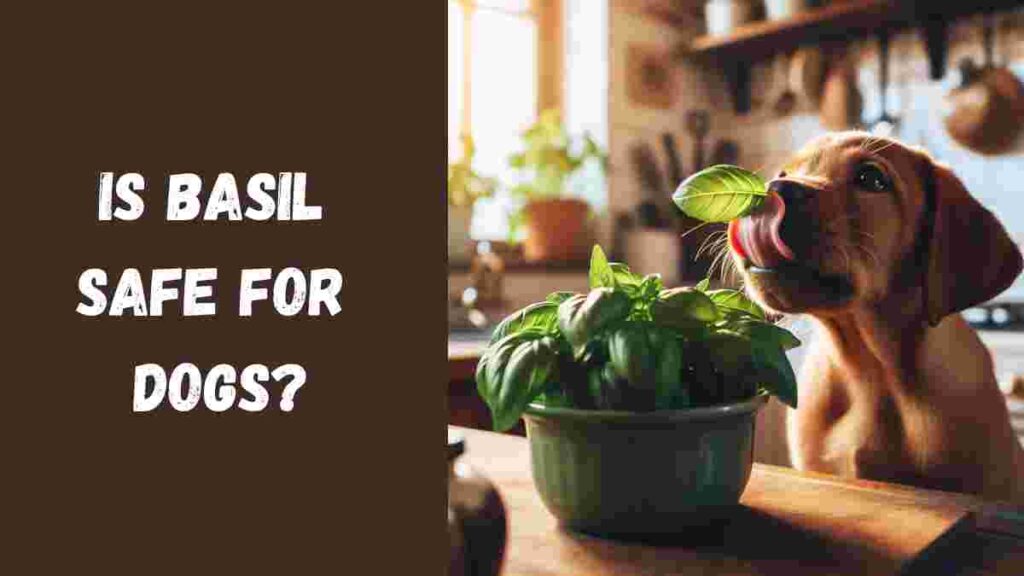Is Basil Safe for Dogs: In a world increasingly aware of the benefits of natural, whole foods for our health, it’s no surprise that pet owners have begun to question how they might extend these principles to their canine companions.
One such common query is around the herb basil – is it as beneficial or perilous for our furry friends as it can be for us? This comprehensive post doesn’t just answer the question, but also deep dives into the world of basil, its properties, and how it might impact your dog’s health.
Table of Contents

Setting the Context: Natural Wellness for Dogs
Pet owners are searching for ways to enhance their dog’s health and well-being beyond traditional kibble. The allure of natural remedies for common ailments and to boost overall health is irresistible. Basil, an herb rich in flavor and history, has found its way into the culinary and medicinal practices of many cultures. This article serves to inform, rather than to recommend, how basil can fit – or not fit – into your dog’s diet safely.
The Allure of Basil’s Versatility
Basil is not only famous for its role in Italian cuisine but is celebrated for its powerful antioxidant and anti-inflammatory properties that can support human health. Could these benefits extend to your four-legged friend?
Learning About Basil’s Safety for Dogs
Understanding this delicate balancing act is crucial for pet owners keen on offering a varied, yet safe, diet to their dogs.

Understanding Basil and Its Varieties – Is Basil Safe for Dogs?
Before we can ascertain its safety for canines, we must get to know basil better. This section introduces the herb from its roots to its many uses.
A. What is Basil?
Basil is a plant that belongs to the mint family, and its botanical name is Ocimum basilicum. It is known for its bright green leaves and distinct aroma and is commonly used as a seasoning in many cuisines.
B. Varieties of Basil and Their Characteristics
While sweet basil is the variety most often used in cooking, others, like Thai basil and holy basil, boast unique flavors and cultural significances.
C. Nutritional Composition of Basil
Basil is low in calories and a great source of vitamins A, K, and C, as well as minerals like manganese and copper, essential for organ function.

Health Benefits of Basil for Humans
An exploration into what makes basil a superstar in human nutrition leads to potential insights into how it might benefit your dog.
A. Overview of Basil’s Health Benefits in Human Nutrition
From enhancing flavor in dishes to providing various health-promoting properties, basil is a worthy addition to the human diet.
B. Antioxidant Properties
Antioxidants in basil can help protect body cells from damage by free radicals, and these benefits can be just as relevant for dogs.
C. Anti-inflammatory Effects
Basil’s anti-inflammatory capabilities may support the treatment and prevention of chronic diseases in humans. While dogs can benefit from these effects, levels need to be strictly controlled.
D. Potential Uses in Human Medicine
Basil has been studied for potential antibacterial and cancer-fighting properties. While such uses are not directly transferable to dogs, the research suggests a world of untapped potential.
Is Basil Safe for Dogs?
The core question addressed head-on—can dogs consume basil safely?
A. Assessing Basil’s Safety for Canines
Basil is not toxic to dogs, which is good news. However, there are some important considerations to keep in mind.
B. Considerations Before Feeding Basil to Dogs
When considering adding basil to your dog’s diet, you must think about potential allergies, digestibility issues, and the rare case of overconsumption.
1. Potential Allergies
Dogs, like humans, can be allergic to basil. Any new food introduction, including basil, should be done gradually, while observing for adverse reactions.
2. Digestibility Issues
Some dogs may experience digestive discomfort when eating basil, particularly when introduced in large amounts.
3. Toxicity Concerns
While basil is not inherently toxic to canines, overconsumption in the case of some diseases can lead to issues. It’s imperative to always consult with a veterinarian before making significant diet changes.

Health Benefits and Risks of Basil for Dogs – Is Basil Safe for Dogs?
Basil could offer some advantages for dogs but also carries potential risks. Let’s find out Is Basil Safe for Dogs?
A. Potential Health Benefits for Dogs
From freshening breath to acting as a gentle digestive aid, basil might have a place in a dog’s diet.
1. Freshening Breath
Basil’s aromatic compounds can contribute to fresher breath, a boon for dogs and dog owners alike.
2. Digestive Aid
The herb may stimulate appetite and aid in the digestive process, providing some comfort for dogs with mild stomach issues.
3. Anti-inflammatory Effects
Comparable to human conditions, basil might assist dogs suffering from minor inflammatory conditions.
B. Risks Associated with Feeding Basil to Dogs
Balanced against benefits, there are potential risks that come with feeding basil to dogs.
1. Allergic Reactions
Allergic responses can range from mild to severe and include symptoms such as itching, redness, swelling, vomiting, or diarrhea.
2. Gastrointestinal Upset
Ingesting large amounts of basil or ingesting it all at once can cause stomach upset in pets.
3. Toxicity Issues
Extremely high quantities, which are hard to achieve through regular food consumption, might result in basil poisoning, although this is rare.
Safe Ways to Feed Basil to Dogs – Is Basil Safe for Dogs?
Should you wish to feed basil to your dog, doing so in a controlled manner is essential. Here’s how to go about it.
A. Moderation is Key: Recommended Basil Portions for Dogs
Incorporating basil into your dog’s diet should be done in moderation, with portion sizes suited to your dog’s size and health needs.
B. Preparation Tips: Serving Basil to Dogs Safely
Always serve basil to dogs in a form that makes it easily digestible. Mincing or pureeing the herb can aid in this.
C. Creative Ways to Incorporate Basil into Dog’s Diet
From adding a pinch to homemade dog treats to infusing water, there are creative ways to include basil in your dog’s diet.
Signs of Basil Toxicity in Dogs
While unusual, it’s essential to be aware of the symptoms of basil poisoning.
A. Recognizing Symptoms of Basil Poisoning in Dogs
Lethargy, weakness, and gastrointestinal distress are the primary indicators that your dog may be suffering from basil toxicity.
B. Immediate Steps to Take if Your Dog Consumes Too Much Basil
If you suspect your dog has overindulged in basil, offering small amounts of water and observing for worsening symptoms is the initial course of action.
C. When to Seek Veterinary Assistance
If symptoms persist or worsen, it’s time to head to the vet for a professional evaluation.
You May Also Like
Frequently Asked Questions (FAQ) – Is Basil Safe for Dogs?
Can Dogs Eat All Types of Basil?
The answer is yes—with caution. Always introduce new varieties gradually and in small amounts.
How Should Basil Be Prepared for Dogs?
In a suitable form for consumption, minced or pureed is common for doggy diets.
Are There Any Alternatives to Basil for Canine Health?
If basil doesn’t agree with your dog, there are other safe herbs and spices that also offer health benefits.
Wrapping Up – Is Basil Safe for Dogs?
The final verdict on basil for dogs is that while it can provide some health benefits when fed in moderation and prepared safely, it should only be introduced after consultation with your veterinarian. Like any food, the key to a dog’s well-being is a balanced, thoughtfully curated diet.
Considering the potential advantages, the key is to take measured steps and always watch for any unwelcome reactions or behaviors in your beloved pet. With this thoughtful approach, basil might just become a not-so-secret ingredient in the holistic care of your furry companion.

Pingback: Can Chickens Eat Quaker Oats? Understanding the Amazing Role of Quaker Oats in Poultry Nutrition [2024 Update] - Pawfect Pet Tips